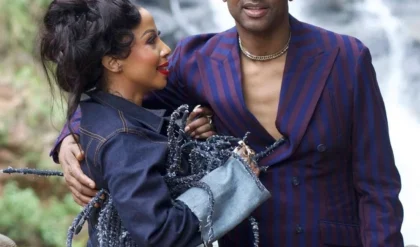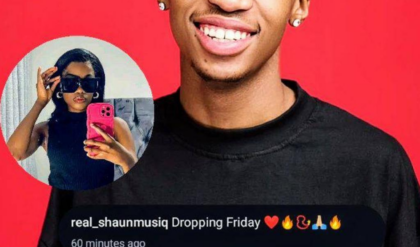Recently, social media has been buzzing with a viral audio recording allegedly involving South African rapper Big Zulu. In the recording, the speaker claims to be involved in “ritual practices,” stating they feed a snake live chickens daily in exchange for wealth and that the snake “sleeps with them.”
The rumors gained traction as many people believed the voice in the recording belonged to Big Zulu. However, the rapper has denied any connection to the recording, affirming his success is a result of hard work. So, what’s the truth?
The Origin of the Controversial Recording
The audio clip spread rapidly across social platforms, with the speaker narrating how they care for a snake that allegedly grants them wealth. What shocked listeners was the claim that Big Zulu’s name was associated with the recording.

However, fans familiar with Big Zulu’s voice argued that the voice in the recording didn’t match his. Some suggested the voice might belong to someone else from KwaZulu-Natal, a region with a distinct Zulu accent. Others speculated that the recording might have been manipulated using AI or was part of a deliberate smear campaign against the rapper.
Big Zulu’s Response
Amid the controversy, Big Zulu issued an official response on his social media platforms. He expressed disappointment over the baseless allegations, asserting that his success stems from hard work and blessings from his ancestors, not from any “ritual practices.”
Big Zulu stated:
“People have seen me struggle. I worked tirelessly to get where I am today. These rumors about me being involved in rituals or owning a snake are entirely false. Everything I have, God and my ancestors have blessed me with.”
The rapper also dismissed claims from the recording that he was “about to die.” He reassured fans that he was not afraid of death, stating that if his time came, he would face it with peace, but the rumors were unfounded.
Why Such Rumors Persist
Rumors of “ritual practices” often surface around successful figures in South Africa, particularly in KwaZulu-Natal, where traditional spiritual beliefs are deeply rooted. It’s not uncommon for people to speculate that extraordinary success must be tied to supernatural forces.

Stories of rituals and sacrifices frequently circulate on social media, perpetuating the notion that success cannot be achieved solely through hard work. This belief can foster resentment and suspicion, particularly toward public figures like Big Zulu who rise to prominence from humble beginnings.
Impact on Big Zulu
These allegations not only damage Big Zulu’s reputation but also affect his career and relationship with his fans. The rapper expressed gratitude for his success and for being able to help others through his achievements, which makes the accusations even more hurtful.
He added:
“I have always tried to use my success to create opportunities for others. It’s heartbreaking that people are so quick to believe and spread false rumors without verifying the truth.”
The Role of Technology and Media in Spreading Rumors
Some speculate that the audio recording could have been artificially created using AI technology, mimicking Big Zulu’s voice to spread misinformation. While there’s no concrete evidence to support this, the case highlights the risks posed by advanced technologies in producing convincing fake content.

Others suggest the recording might have been orchestrated by individuals targeting Big Zulu to tarnish his image. Media experts and psychologists note that in South Africa, where beliefs in spiritual practices remain widespread, such stories can easily captivate public interest and spread rapidly.
Conclusion
The controversy surrounding Big Zulu is a stark reminder of the importance of verifying information before spreading it online. The rapper has firmly denied the allegations and emphasized that his success is the result of relentless effort and ancestral blessings, not any ritual practices.
This incident also underscores the dangers of rumors and the growing potential for fake content creation using advanced technology. Fans and the public must approach unverified information with caution to avoid harming the reputations and lives of those involved.
News
Kelly Khumalo and Arthur Mafokate ‘wedding’: It was new music all along
When images of Arthur Mafokate and Kelly Khumalo started trending on social media a few weeks ago, rumours about a possible romance and a possible marriage between the two musicians spread like wildfire. It was all purely speculative, as no…
‘Mampintsha was never broke’: Babes Wodumo clears the air on lobola claims
‘I can confirm that, as the Simelanes, we received lobola from Mandla and not from Showmax or PAP,’ Babes Wodumo’s manager said. Babes Wodumo and the late Mampintsha. Images: Instagram @viraltrends Award-winning Gqom queen Babes Wodumo has downplayed allegations made…
29-Year-Old Black Entrepreneur Wants to Buy Spirit Airlines to Make it America’s First Black-Owned Commercial Airline
29-year-old entrepreneur Hashim Walters from New Orleans, Louisiana, has officially launched The Latimer Group, an ownership consortium focused on acquiring Spirit Airlines, an iconic brand facing critical financial distress. He says that his mission is to empower African American economic…
What Gogo Maweni Just Did Is So Heart Breaking
The Escalating Drama Between Scoten and Goa: A Deep Dive into a Social Media War In the world of social media, the line between entertainment and personal conflicts often becomes blurred. This is evident in the ongoing drama between two…
SHOCKING 😯 MPUMELELO MSELEKU SHOT AND KIL#ED SOMEONE…||ALLEGEDLY .
The Latest Update on the Controversy Involving Somizi and Mohale In the world of entertainment, the drama surrounding the relationship between Somizi Mhlongo and Mohale Motaung has become one of the most talked-about topics. This couple has consistently been in…
Strange Things About Somizi And Mohale That No One Talks About
Strange Things About Somizi and Mohale’s Relationship That People Never Talk About In the world of South African celebrity gossip, one relationship that has sparked both admiration and speculation is that of Somizi Mhlongo and Mohale Motaung. The two have…
End of content
No more pages to load











